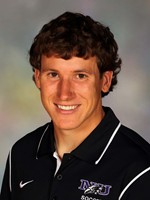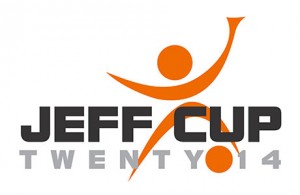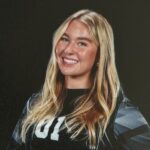Jeff Cup Q&A: Niagara coach Eric Barnes talks recruiting, high school vs. DA and more
MIDLOTHIAN, Va. – The Jefferson Cup draws hundreds of NCAA coaches from across the country, attracted by the event’s massive size and high density of talent in showcase brackets.
 It also offers them particularly good access to players outside their own regions, as the tournament usually brings in teams from a wide range of geographical areas from across the continent, albeit with a higher number of them hailing from the Mid-Atlantic and Southern states.
It also offers them particularly good access to players outside their own regions, as the tournament usually brings in teams from a wide range of geographical areas from across the continent, albeit with a higher number of them hailing from the Mid-Atlantic and Southern states.
That’s one of the main factors that drew Eric Barnes to this year’s edition. A native of South Carolina, Barnes now leads the men’s soccer program at Niagara University in Lewiston, N.Y., and is keenly interested in broadening his player pool by identifying promising recruits from down south and other parts of the country further afield
Jeff Cup is also one of only a few showcase events that can provide prolonged access to a high number of blue-chip recruits playing outside the U.S. Soccer Development Academy system, where a professional-stye, 10-month training calendar requires its players to give up high school soccer and other such activities.
SoccerWire.com spent a few minutes chatting with Barnes about these and other topics last weekend during Jeff Cup showcase action on a chilly night at the River City Sportsplex.
SoccerWire.com: Why did you come to this year’s Jefferson Cup and what are your impressions?
Eric Barnes: I’m actually from South Carolina, my assistant [coach] Miguel [Rodrigues] is from Florida, so we’ve done a pretty good job pulling kids from the Southeast region. We’re getting a final look for the 2014 [recruits] and getting a head start on the ’15 and 1’6 classes.
[Jeff Cup is] similar to the CASLs and Disneys [showcase events]. That’s the type of event we’re going to, other than the U.S. Soccer [Development Academy] ones. It’s pretty comparable.
SW: We hear a lot about the DA siphoning off the country’s top talent, but it seems that there stil plenty of solid players here, and they’re being watched by big-time NCAA programs.
Barnes: A lot of it just depends on the location of some of the places, too. There’s only one team in South Carolina, which is where I’m from. And there’s some kids in certain areas where there’s just not an academy team, so you can normally find really top-caliber players that are equivalent to the academy kids in those areas – and in some cases, choose not to play. They want to play high school or they play other sports – especially with our goalkeepers. We have goalkeepers that play either baseball or basketball or some other sport…and they can’t play academy, because they can’t do anything besides that.
[ +Find SoccerWire’s full range of Jefferson Cup coverage here ]
SW: That begs the question – do you think the DA’s no-high-school rule is working as intended?
Barnes: It really just depends on what you’re looking to get out of it. So from the U.S. Soccer and academy standpoint, it seems like they’re trying to develop more professional standards and have everything to develop for the national team and for the pro leagues. It makes sense in that regard.
 For the other 99 percent of the kids, it doesn’t always make a ton of sense, because they lose that high school experience. There’s always going to be a give and take no matter what you pick. And it’s the same thing with kids that play multiple sports – they won’t have the sport-specific training year round, but they’ll get other things and still get the fitness in. So it’s just finding the balance that’s right for each individual person.
For the other 99 percent of the kids, it doesn’t always make a ton of sense, because they lose that high school experience. There’s always going to be a give and take no matter what you pick. And it’s the same thing with kids that play multiple sports – they won’t have the sport-specific training year round, but they’ll get other things and still get the fitness in. So it’s just finding the balance that’s right for each individual person.
SW: What is the vaue of that “high school experience,” in your opinion?
Barnes: It’s your one chance in your whole life where you get to be a star. You might be No. 10 or 11 on the academy roster when they pull from a three- or four-hour radius, but [high school] is your one chance in your life to be a superstar – and you’re going to have all your friends out there watching you, and it’s an experience that you’ll never get again, unless you just happen to be the best player at your college.
So in that regard it’s really good. In terms of character-building, you get to build the leadership. You might not have the leadership position on an academy team, but you’re the guy they’re looking to if you’ve been playing competitive travel soccer your whole life and you’re a junior or senior on your high school soccer team.
“You might be No. 10 or 11 on the academy roster when they pull from a three- or four-hour radius, but high school is your one chance in your life to be a superstar.”
SW: How do you go about making the most of your scouting at big events like this?
Barnes: We’ll have a laundry list of kids that email us, because once your name gets on that list that you’re attending [the tournament], everyone wants to send you an email. So we’ll have a list and we make sure to hit all their games, but we’ll also, on the first day, between the two of us, we try to get to almost every team and just have an initial list of who we want to go back and see again.
Whereas when I was at other schools, sometimes it was, try to spend a whole half at each team, and you might only see them once at an event. So it really just depends on the coaching staff and their style of what they’re trying to do at a tournament event.
SW: How often do you catch sight of a great new player out of the blue?
Barnes: A lot of times it’ll be the kid that’s teammates with the kid that you noticed, that ends up being the one that we’re interested in! So there’s always the surprises, which is why we really make a point to get out and get to every field because some kids from the Southeast have never heard of Niagara University, even though we’re a really good Division I program – they just dont know about it because they see ACC and Southeast schools.
 SW: Really? The Southerners aren’t scared off by your upstate New York weather?
SW: Really? The Southerners aren’t scared off by your upstate New York weather?
Barnes: [Laughs] One of our incoming kids – actually one of our top recruits for next year – is coming out of South Carolina as well. He just loves skiing, so in the offseason he gets to go skiing – he got ski gear for Christmas after he committed. You’ll find players that have area connections, too, family from New York, or Ohio or Michigan, which is all right next to us.
SW: Do players from different regions carry different styles or traits?
Barnes: You’ll see a little bit, but it comes more from the club than the region. The only big regional disadvantage I see is, up north they’re not outside very much. So they have to get used to playing in tighter spaces with limited field time and they’re always at an indoor facility, where you’ll see the southern teams are a little bit better with the big-area spacing. But players up north might be a little bit better in tight spaces and playing out of it, because that’s what they have to deal with four months out of the year when they’re cramped inside.
SOCCERWIRE MARKETPLACE
- visitRaleigh.com Showcase Series 2025, hosted by NCFC Youth
- OFFICIAL MANCHESTER CITY SOCCER CAMPS
- Wanted Licensed Youth Soccer Coach
- Join Official Elite Summer Soccer Camps with Europe’s Top Pro Clubs!
- The St. James FC Travel Staff Coach - North (Loudoun) & South (Fairfax)
- The St. James FC Girls Academy (GA) Head Coach - 2 teams
- The St James FC Boys Travel Tryouts
- OFFICIAL BAYERN MUNICH SUMMER CAMPS U.S.
- JOIN THE ALLIANCE!
- OFFICIAL FC BARCELONA CAMPS U.S.
College Recruiting Commitment Tracker
Featured Players
COLLEGE RECRUITING STARTS HERE
Join the SoccerWire College Soccer Recruiting Search Engine and learn how to be seen OVER 1 MILLION TIMES PER YEAR.
- Basic $99 – for life
- Featured $299 – for life
- Featured PLUS $399 – for life











